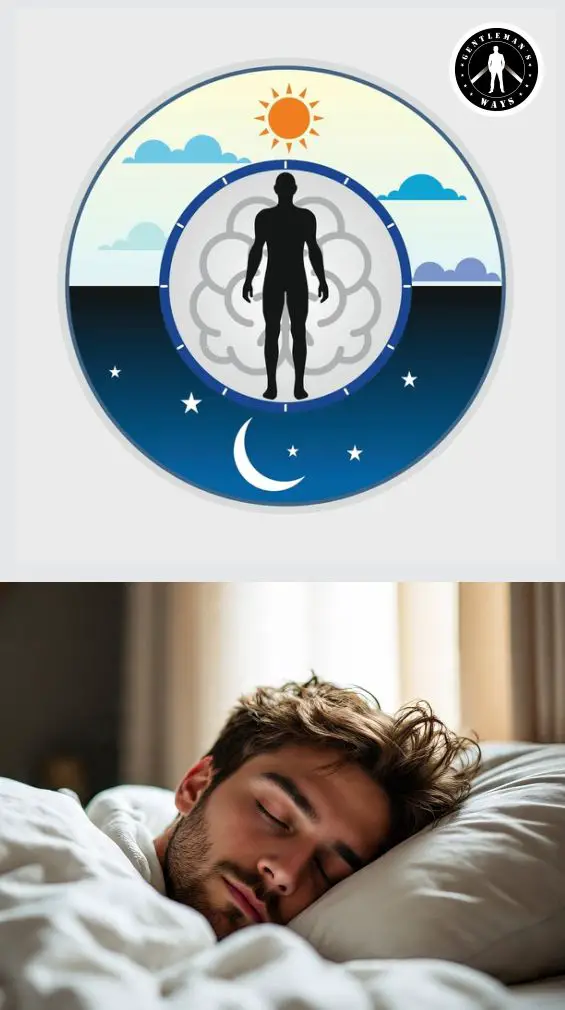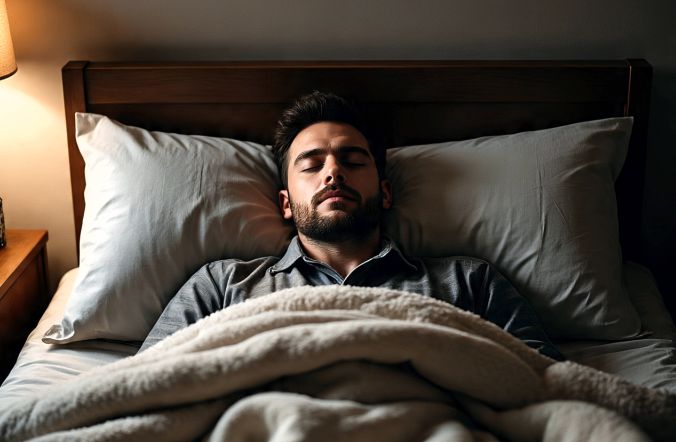Last updated on January 23rd, 2026 at 09:14 pm
Men’s sleep guide is the missing key to lasting energy, faster recovery, and sharper focus, revealing how quality rest transforms men’s health and performance. Gentsways gives insights.
Men’s sleep guide is beyond rest; it’s the foundation of strength, focus, and overall well-being.
Quality sleep fuels recovery, sharpens mental clarity, and powers daily performance, yet many men struggle without realizing the hidden cost of poor sleep.
From late nights scrolling screens to high-stress schedules, modern life often steals the rest men truly need.
This guide dives deep into the science and strategies behind better sleep, tailored specifically for men.
You’ll discover practical routines, nutrition tips, and lifestyle adjustments that support restorative sleep, boost energy, and enhance resilience.
Whether your goal is peak performance, stronger health, or simply feeling more awake and balanced, mastering sleep can transform every aspect of your life.
Start reclaiming your nights and unlock your full potential.
The Science of Male Sleep and The Circadian Rhythm

Understanding the science of male sleep helps you recover faster, stay energized, and maintain focus throughout the day.
Your body follows a natural circadian rhythm that tells you when to be awake and when to rest.
Morning sunlight signals your brain to lower melatonin, boost alertness, and improve mood and cognitive clarity.
As daylight fades, melatonin rises, guiding you toward restorative sleep.
Disrupted rhythms from late-night screens or artificial blue light can make falling asleep harder and reduce sleep quality, affecting memory, focus, and energy.
Your sleep environment matters too.
A dark, cool room with minimal noise supports deeper rest and steady hormone levels.
Consistent sleep and wake times reinforce your internal clock, improve recovery, and support testosterone.
By aligning daily routines with your body clock, you turn sleep into a performance tool that shapes health, energy, focus, and overall productivity.
Why Sleep Boosts Performance, Recovery, and Health
You might think cutting sleep helps you get more done, but it quietly drains your energy, focus, and recovery.
Your body and mind rely on consistent sleep to function at their best.
Getting seven to nine hours each night improves cognitive clarity, stabilizes mood, and keeps stress under control.
For men, quality sleep supports testosterone levels, muscle recovery, and overall energy throughout the day.
Skipping rest slows reaction time, memory, and decision-making, making daily tasks harder.
Simple habits like a consistent sleep schedule, limiting late screen use, and creating a calm bedroom can boost your sleep.
Treating sleep as part of your performance routine strengthens health, supports energy, and helps you stay productive.
Research shows that men who prioritize sleep experience better cognitive performance, stronger muscle recovery, and balanced hormone levels.
Studies from the National Sleep Foundation and Harvard Medical School confirm that sleep deprivation reduces testosterone, raises cortisol, impairs memory, and slows physical recovery.
Even brief sleep loss can affect focus, energy, and mental clarity, while consistent rest supports endurance, strength, and overall vitality.
Prioritizing sleep is a performance strategy that impacts your health, energy, and productivity every day.
Related Posts
How the Quality of Your Sleep Affect Testosterone Level
Men’s Guide to Keeping Fit at Any Age
Consequences of Poor Sleep in Men
Foods that Increase Testosterone Naturally
Men’s Health Tips for Longevity
6 Foods Every Man Should Avoid
The Benefits of Sleep for the Modern Man

Sleep impacts every aspect of a man’s life. Quality rest supports health, energy, and focus, helping you recover, perform better, and maintain balance in daily activities and long-term well-being.
Boosts Energy
Adequate sleep restores energy levels, keeping you alert and active throughout the day.
Rested men can handle work, workouts, and daily challenges with more stamina and less fatigue.
Sharpens Focus
Sleep improves cognitive function, attention, and decision-making.
Men who prioritize rest experience clearer thinking, faster problem-solving, and stronger memory, enhancing productivity at work and efficiency in daily life.
Supports Testosterone
Deep sleep promotes healthy testosterone production, which influences muscle growth, mood, energy, and sexual health.
Maintaining proper rest helps men sustain vitality and overall physical performance.
Aids Muscle Recovery
During sleep, the body repairs tissues and builds muscle.
Men who sleep well recover faster from workouts, reduce soreness, and improve strength and endurance over time.
Stabilizes Mood
Restful sleep regulates emotions, reducing irritability and stress.
Men who sleep consistently feel calmer, more patient, and better able to manage personal and professional relationships.
Strengthens Immunity
Sleep supports the immune system, helping the body fight infections and illness.
Men who rest well experience fewer colds and faster recovery when sickness occurs.
Improves Memory
Sleep consolidates learning and memory. Men who prioritize rest retain information better, recall details faster, and maintain mental sharpness for work, study, and daily problem-solving.
Regulates Stress
Adequate sleep lowers cortisol levels and helps men manage stress.
Rested men respond more effectively to challenges and maintain emotional resilience throughout demanding situations.
Enhances Physical Performance
Sleep improves coordination, reaction time, and endurance.
Men who get proper rest perform better in sports, workouts, and daily physical tasks without unnecessary strain.
Maintains Heart Health
Sleep supports cardiovascular function, lowering blood pressure and reducing the risk of heart disease.
Men who rest consistently protect long-term heart health and overall vitality.
Promotes Overall Well-Being
Consistent sleep enhances mental, emotional, and physical health.
Men who prioritize rest experience higher energy, better focus, stronger immunity, and a healthier, more balanced lifestyle.
The Four Pillars of Sleep Optimization
Sleep affects your energy, focus, and overall health.
Understanding and applying the four pillars of sleep optimization helps you improve sleep quality, recover faster, support hormone balance, and maintain long-term well-being.
Sleep Environment
Your bedroom sets the stage for rest. A dark, cool, and quiet space reduces distractions and supports deeper sleep.
Consider blackout curtains, a sleep mask, or a white noise machine to minimize disruptions.
Managing temperature and light exposure signals your body that it is time to rest, helping you fall asleep faster and enjoy uninterrupted sleep that supports recovery, testosterone balance, and overall energy.
Sleep Schedule
Going to bed and waking up at the same time each day keeps your internal clock steady.
Establish a pre-sleep routine, like reading or gentle stretching, to cue your body for rest.
Consistency improves sleep duration, mental clarity, focus, and recovery, turning your nightly rest into a tool that supports energy, productivity, and overall health.
Lifestyle Choices
Your daily habits shape how well you sleep. Balanced nutrition, regular exercise, and limiting stimulants like caffeine or alcohol boost sleep quality.
Reducing evening screen time helps your body produce melatonin naturally.
Making mindful lifestyle choices supports deeper rest, faster recovery, hormone balance, and better energy for daily performance.
Stress Management
Stress directly affects how well you sleep. Using mindfulness practices, meditation, or yoga helps calm your mind and body.
Addressing stressors improves relaxation, promotes restorative sleep, and protects energy levels, cognitive focus, and overall health, making each night more productive and your days more balanced.
Age and Sleep in Men
Sleep changes as you move through life, affecting energy, focus, recovery, and overall health.
Understanding how age impacts your sleep helps you adjust routines, support hormones, and maintain better rest at every stage.
Sleep in Young Men 20s to 30s
In your twenties and thirties, sleep tends to be deeper and more restorative.
Your body recovers faster from physical activity, and hormone levels, including testosterone, support energy and muscle repair.
Consistent rest helps maintain focus, mood, and overall health.
Even at this stage, late nights, screen time, and stress can disrupt sleep quality, so paying attention to routines keeps your rest productive and your body prepared for daily challenges.
Sleep in Middle-Aged Men
As you enter your forties and fifties, sleep may become lighter and shorter.
Hormonal shifts, including gradual decreases in testosterone, affect recovery, energy, and focus.
You may notice more frequent awakenings at night or trouble falling asleep.
Adjusting your sleep environment, limiting caffeine, and sticking to a consistent schedule help maintain deep rest and support mental clarity and overall health.
Sleep in Older Men
In later years, sleep patterns shift further. You may wake earlier, sleep fewer hours, or experience fragmented sleep.
Hormonal changes and medical conditions can make rest less restorative.
Prioritizing a dark, quiet, cool bedroom, practicing calming pre-sleep routines, and addressing stress helps your body maintain recovery, energy, and cognitive function.
Paying attention to sleep supports health, focus, and vitality even as natural rhythms change.
The Connection Between Fitness, Hormones, and Sleep
Sleep plays a major role in your strength, energy, and body composition.
Understanding how rest interacts with hormones and workouts helps you recover, build muscle, and manage weight more effectively.
Sleep’s Role in Testosterone and Muscle Growth
When you sleep, your body produces testosterone, a hormone that supports muscle repair, strength, and energy.
Skipping sleep lowers testosterone and slows recovery from workouts.
Consistently getting enough rest helps your muscles rebuild, boosts performance in the gym, and maintains energy levels throughout the day.
Sleep becomes the foundation that supports growth, endurance, and hormone balance, helping you stay strong and healthy.
Sleep and Fat Loss in Men
Quality sleep regulates hormones like cortisol and leptin that control appetite, fat storage, and metabolism.
Poor sleep increases cravings and reduces energy for activity, making it harder to lose fat.
Prioritizing rest helps your body burn calories efficiently, supports fat loss goals, and improves energy for workouts.
Sleep is not just recovery time but a key factor in managing body composition.
The Workout and Sleep Connection
Your exercise routine and sleep quality are linked. Physical activity promotes deeper, more restorative sleep, while adequate rest improves strength, reaction time, and endurance in training.
Missing sleep reduces performance and recovery, increasing the risk of injury and fatigue.
Timing workouts and prioritizing rest together ensures your energy, focus, and muscle growth stay on track.
Sleep Disorders and Men’s Health Risks
Sleep impacts your energy, focus, recovery, and long-term health.
Understanding how disorders affect men helps you identify symptoms early, seek treatment, and protect hormone balance, cardiovascular health, and overall well-being.
Obstructive Sleep Apnea (OSA)
Men are at higher risk for OSA due to factors like neck size, body mass index, and hormonal changes.
Key signs include loud snoring, gasping or choking during sleep, and excessive daytime fatigue.
Untreated OSA increases the risk of high blood pressure, stroke, diabetes, and heart problems.
Treatment options include CPAP therapy, oral appliances, weight management, and lifestyle changes that support better breathing and overall health.
Insomnia and Delayed Sleep Phase Syndrome
Chronic insomnia occurs when standard sleep hygiene strategies fail.
You may struggle to fall asleep or stay asleep, leading to fatigue, low focus, and irritability.
Delayed Sleep Phase Syndrome, or the night owl pattern, is common in younger men and shift workers, causing late sleep onset and difficulty waking early.
Professional guidance, consistent routines, and behavioral therapy can help reset your sleep cycle.
Nocturia (Nighttime Urination)
Frequent nighttime urination disrupts sleep and impacts recovery, energy, and hormone balance.
Causes include age, prostate health, or drinking too much fluid in the evening.
Adjusting liquid timing, limiting caffeine or alcohol late in the day, and elevating legs before bed can reduce bathroom trips and improve sleep quality.
Addressing underlying health issues may also be necessary for long-term improvement.
More on sleep disorders in men here.
Connection Between Sleep and Mental Health
When you miss sleep, your mind reacts before your body does.
Lack of rest can make your emotions sharper, your focus weaker, and your responses to stress heavier.
Anxiety and low mood can build faster when your nights are restless, creating a loop where poor sleep fuels mental strain and mental strain disrupts sleep.
You may notice irritability, mood swings, or trouble handling daily pressures when this cycle takes hold.
Paying attention to your sleep can change this. Simple steps like keeping a steady bedtime, winding down before sleep, and limiting caffeine can improve how you feel.
Cognitive behavioral therapy for insomnia can help reshape thoughts and habits around rest.
Prioritizing sleep gives you clarity, steadier emotions, and better mental resilience.
Men’s Sleep Guide: Natural Ways to Improve Sleep Quality
Good sleep impacts your energy, recovery, focus, and overall health.
By adjusting your habits, nutrition, environment, and stress management, you can naturally improve rest, support hormone balance, and recover faster.
Lifestyle and Daily Habits
Your daily routines set the stage for quality sleep.
Going to bed and waking at the same time keeps your circadian rhythm steady, signaling your body when to rest.
Exercise helps, but timing matters: morning workouts boost alertness, while evening workouts can energize you too close to bedtime.
Reducing caffeine, alcohol, and nicotine improves sleep depth, helping you recover faster, maintain testosterone levels, and stay focused during the day.
Small lifestyle changes have a big impact on energy and performance.
Nutrition and Sleep
What you eat affects how well you sleep. Foods rich in magnesium, tryptophan, or natural melatonin help your body relax and fall asleep faster.
Heavy, spicy, or high-sugar evening meals can disrupt rest, while drinking too much water late at night may cause unnecessary awakenings.
Paying attention to nutrition supports deeper sleep, hormone balance, and effective recovery for energy and fitness.
Sleep Environment and Bedroom Hacks
Your bedroom should signal rest to your body. Keep the room dark, quiet, and cool to promote melatonin production.
Invest in a mattress and pillow that support your body and spinal alignment. Limit exposure to screens and blue light in the evening.
Small changes in your environment, like blackout curtains or white noise, can help you fall asleep faster, stay asleep longer, and wake refreshed.
Stress and Mind Management
Stress affects your cortisol levels and sleep quality.
Practicing mindfulness, meditation, or breathing exercises calms your mind and reduces tension before bed.
Journaling or evening routines help you process thoughts and unwind.
Managing stress supports deeper sleep, hormone balance, mental clarity, and overall recovery, giving you more energy and focus for the next day.
Natural Aids and Remedies for Sleep for Modern Men
Sleep impacts your energy, recovery, focus, and overall health.
Using natural aids and remedies can support deeper rest, balance hormones, reduce stress, and improve mental clarity without relying on medication.
Herbal Teas
Certain herbal teas help signal your body that it is time to rest.
Chamomile soothes the nervous system, promoting relaxation, while valerian root can reduce the time it takes to fall asleep.
Drinking a warm cup in the evening helps calm your mind and prepares your body for deeper, restorative sleep.
Regular use supports better hormone balance, recovery, and daily energy levels.
Magnesium and Natural Supplements
Magnesium supports muscle relaxation and nervous system function, helping you fall asleep more easily.
Other natural supplements, such as melatonin or L-theanine, can regulate your sleep-wake cycle and support hormone balance.
Using these safely and consistently improves sleep quality, recovery, and overall mental focus.
Aromatherapy and Essential Oils
Scents like lavender, cedarwood, and sandalwood influence the nervous system, helping reduce tension and promote calm before bed.
Diffusing essential oils or adding them to a warm bath can create a restful environment that supports deeper sleep, better recovery, and mental clarity.
Safe Relaxation Techniques Without Medication
You can prepare your body for sleep with techniques like deep breathing, progressive muscle relaxation, or guided meditation.
These methods reduce stress and lower cortisol levels, helping you fall asleep naturally and maintain uninterrupted rest, supporting energy, hormone balance, and overall health.
Reasons Men Should Seek Medical Help for Sleep
Persistent Insomnia
If you struggle to fall asleep or stay asleep for weeks or months, it may indicate an underlying condition.
Chronic insomnia affects energy, focus, and hormone balance, and professional evaluation can help restore consistent, restorative sleep.
Loud Snoring or Gasping
Frequent snoring, pauses in breathing, or waking gasping may signal sleep apnea.
Untreated, it can lead to low oxygen levels, fatigue, heart strain, and decreased testosterone.
Medical assessment ensures proper diagnosis and effective treatment.
Daytime Fatigue or Brain Fog
Feeling tired, unfocused, or forgetful despite adequate time in bed could mean your sleep quality is poor.
Persistent daytime sleepiness may require medical attention to prevent long-term cognitive or metabolic issues.
Mood Swings or Irritability
Frequent irritability, anxiety, or low mood can result from disrupted sleep.
Identifying underlying sleep disorders with a professional can improve emotional stability, hormone balance, and overall quality of life.
Health Conditions Worsening
Sleep problems that coincide with high blood pressure, diabetes, heart disease, or low testosterone signal the need for medical evaluation.
Proper sleep management supports recovery, metabolism, and overall health.
Conclusion
Quality sleep is the foundation of your strength, focus, and energy.
By imbiding this men’s sleep guide, prioritizing rest, you support hormone balance, mental clarity, and physical recovery.
Small adjustments to routines, nutrition, and your environment help you fall asleep faster, stay asleep longer, and wake ready for the day.
Understanding your body’s circadian rhythm, managing stress, and addressing sleep disruptions improve overall health and daily performance.
Whether you want better workouts, sharper focus, or more energy for work and family, consistent rest transforms your life.
Treat sleep as a tool for health and productivity, not a passive activity.
With the right habits, environment, and attention to your body’s signals, as explained in this men’s sleep guide, you can protect testosterone, support immunity, and enhance endurance, ensuring each day feels productive, balanced, and energized.
Frequently Asked Questions about Men’s Sleep Guide
What is the ideal sleep duration for men?
Most men need seven to nine hours of sleep per night for optimal hormone balance, mental clarity, energy, and recovery.
How does poor sleep affect testosterone levels?
Inadequate sleep lowers testosterone, impacting muscle growth, energy, mood, and overall physical performance in men.
Can lifestyle changes improve sleep naturally?
Yes. Consistent routines, proper nutrition, exercise, stress management, and a cool, dark bedroom all support better sleep quality and recovery.
When should a man see a doctor about sleep issues?
Seek professional help if insomnia, snoring, daytime fatigue, or mood changes persist, as these may signal sleep apnea or other disorders.
References
Pious Clements, an influential and experienced writer, is prolific on social issues and challenges prevailing gender roles on his website, “The Conducts of Life”. With an unwavering commitment to inclusivity and equality, Pious fearlessly unpacks societal norms and sheds light on the overlooked complexities.
His eloquent analyses and thought-provoking articles make him a trusted voice amplifying narratives that have long been silenced. Join Pious on his journey as he strives to reshape the world, one word at a time.

